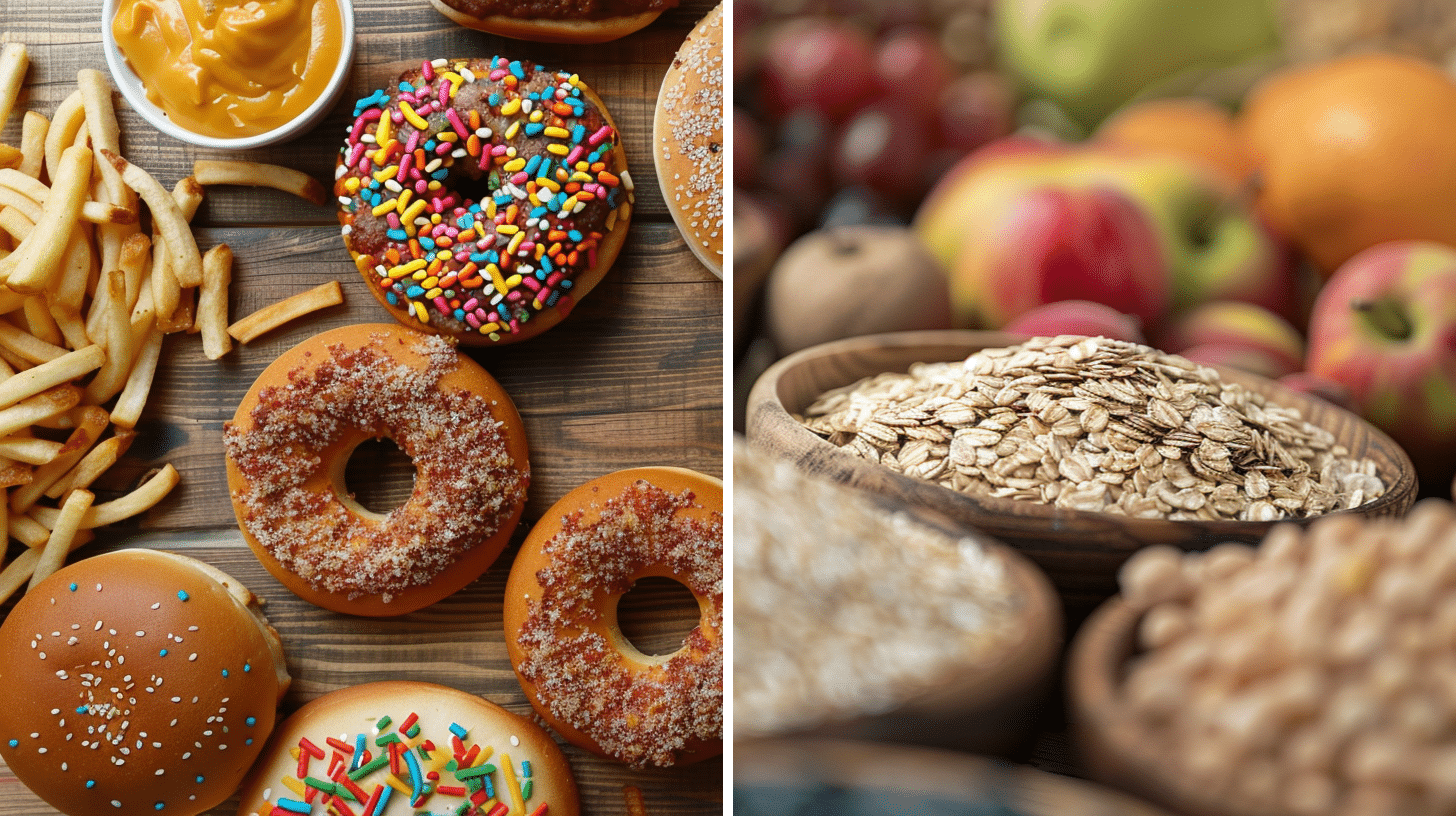
Weight Loss Myths
Navigating Through Misconceptions to Achieve Lasting Health and Wellness
Weight loss myths are pervasive in today’s society and are often disseminated through various media channels. These misconceptions and unrealistic weight loss expectations can hinder individuals’ progress toward healthier lifestyles. Providing accurate information and educating individuals on the keys to successful weight loss is crucial to combating these myths.
One prevalent myth is the belief that avoiding all carbohydrates leads to weight loss. However, it is important to differentiate between “empty” carbs in processed foods and nutritious carbs in whole grains and fruits, which provide essential nutrients and fiber. Another common myth is that eating frequent, small meals throughout the day can boost metabolism and aid in weight loss. In reality, the frequency and size of meals have little impact on weight loss; what matters most is the overall balance of the diet.
Additionally, exercise is a critical component of weight loss, as it burns calories and promotes muscle growth, which can help boost metabolism. By dispelling these and other weight loss myths, individuals can make informed decisions and achieve long-term success in sustainable weight loss.

Extreme Diets Lead to Sustainable Weight Loss
Extreme diets are often marketed as a quick and easy solution for weight loss. However, these diets can have potential dangers and drawbacks regarding sustainable weight loss. While they may lead to short-term weight loss, they are not effective in the long term. These extreme diets often restrict certain food groups, drastically reduce calorie intake, or promote unhealthy eating patterns. As a result, they can lead to nutrient deficiencies, muscle loss, and a slower metabolism. Examples of popular extreme diets include the ketogenic diet, juice cleanses, and the cabbage soup diet.
Despite their popularity, these diets could be more sustainable and beneficial for long-term weight loss goals. Adopting a balanced and holistic approach to weight loss is essential, focusing on healthy lifestyle changes rather than quick fixes. By incorporating regular exercise, eating a well-rounded diet, and practicing mindful eating habits, individuals can achieve sustainable and healthy weight loss without the potential dangers associated with extreme diets.

Supplements Can Replace Diet And Exercise
Regarding weight loss, there is no shortage of myths and misconceptions. One common myth is that some believe that supplements can replace diet and exercise. However, this is far from the truth. While supplements may provide some benefits, they should never be considered as a replacement for a well-balanced diet and regular physical activity. A healthy diet provides essential nutrients that cannot be obtained from supplements alone, while exercise helps to burn calories and build muscle.
Furthermore, weight loss supplements have been found to lack effectiveness and potentially cause dangers. Many of these supplements are marketed with deceptive claims, promising quick and easy weight loss without the need for diet or exercise. It is important to remember that sustainable weight loss requires a combination of healthy eating habits and regular physical activity rather than relying on supplements or falling for deceptive marketing tactics.
Specific Foods Can Burn Fat
Many people struggling with weight loss often look for quick and easy solutions, including specific foods that can burn fat. While little scientific evidence supports this concept, many believe that specific foods can burn fat, with certain foods such as pineapple, ginger, onions, avocados, and many others often touted to speed up metabolism and aid in fat burning. These foods are believed to have properties that increase the body’s ability to burn calories and stimulate the metabolism.
While incorporating these foods into a balanced diet may have some health benefits, it is important to remember that weight loss ultimately comes down to consuming fewer calories than you burn. These specific fat-burning foods can be a part of a healthy diet; they should not be solely relied upon as a miracle solution for weight loss.

You Must Exercise Intensely Every Day
Weight loss myths are pervasive in today’s society, often leading individuals down a path of frustration and disappointment. One common misconception is the belief that intense exercise is necessary for weight loss. While vigorous physical activity certainly has benefits, it is not the sole indicator of successful weight loss. Instead, the key lies in calorie reduction. Individuals can effectively shed unwanted pounds and achieve their weight loss goals by focusing on creating a calorie deficit.
It is essential to debunk the myth that intense exercise is the only way to lose weight. Moderate-intensity exercises can also contribute significantly to shedding those extra pounds. Such exercises include brisk walking, swimming, cycling, or participating in group fitness classes. These types of activities not only burn calories but also improve cardiovascular health and muscle tone. By engaging in moderate-intensity exercises regularly, individuals can create a sustainable and enjoyable workout routine that supports their weight loss journey without overexerting themselves.
Instead of believing that you must exercise intensely every day to lose weight, it’s important to recognize that a well-balanced approach—including a healthy diet and consistent, enjoyable physical activity—can lead to lasting results.

Carbohydrates Are The Enemy
Carbohydrates have long been vilified as the enemy of weight loss, but the validity of this claim is questionable. While it is true that excessive consumption of carbohydrates can harm health and weight management, it is important to recognize that not all carbohydrates are created equal. Simple carbohydrates, found in sugary snacks and processed foods, can lead to weight gain and an increased risk of diseases like diabetes. This is why some people believe that carbohydrates are the enemy, but complex carbohydrates—such as whole grains, fruits, and vegetables—are essential for a balanced diet and can contribute to weight loss. To minimize carbohydrate consumption, it is recommended to opt for complex carbohydrates over simple ones and to balance carbohydrate intake with fiber and protein. These strategies promote better health and help with sustainable weight management.
Skipping Meals Aids in Weight Loss
Many individuals seeking to lose weight may consider skipping meals a potential strategy. While some believe that skipping meals aids in weight loss, this approach may have several drawbacks hindering successful weight loss. Firstly, skipping meals can put individuals at a higher risk of overeating later in the day. When the body is deprived of necessary nutrients, it can trigger intense hunger pangs, leading to a greater likelihood of consuming larger portions and indulging in unhealthy food choices. This can ultimately sabotage weight loss efforts and lead to weight gain instead.
Instead of skipping meals, adopting a balanced and nutritious eating pattern is essential for achieving successful weight loss. Eating regular, healthy meals throughout the day helps to stabilize blood sugar levels and prevent extreme hunger. By including a variety of nutrient-dense foods, such as fruits, vegetables, whole grains, lean proteins, and healthy fats, individuals can satisfy their nutritional needs and stay satiated for extended periods. Additionally, having a structured eating schedule promotes better appetite regulation and reduces the temptation to snack on unhealthy foods. Ultimately, embracing a balanced and regular eating pattern is key to sustainable weight loss and overall well-being.
Rapid Weight Loss is the Most Successful
Many people are drawn to the idea that rapid weight loss is the most successful approach to achieving their weight loss goals. However, this is a weight loss myth that can lead to disappointment and even health risks. Sustainable weight loss, on the other hand, is a much better approach for long-term success. One of the main factors contributing to sustainable weight loss is adopting a balanced diet. This means consuming a variety of nutrient-dense foods in appropriate portions. Crash diets or extreme restrictions may initially result in rapid weight loss, but they are difficult to maintain and often lead to a cycle of weight regain. A balanced diet provides the necessary nutrients for optimal health and helps to support sustainable weight loss in the long run.
Additionally, incorporating moderate-intensity exercise into your routine and setting realistic goals is crucial for achieving gradual and sustainable progress towards your target weight. So, rather than seeking rapid weight loss, it is important to focus on the factors contributing to sustainable weight loss for a healthier and more successful weight loss journey.
Fat-free Foods are Always a Healthier Option
One common weight loss myth that has gained popularity is the belief that fat-free foods are always a healthier option. Over the years, this claim has become widely accepted, and many people believe that cutting out fat from their diet will lead to weight loss and improved health. However, this notion is far from the truth.
While it is true that consuming excessive amounts of unhealthy fats can contribute to weight gain and various health issues, the idea that all fat-free foods are automatically healthier options is oversimplified and inaccurate. Many fat-free foods compensate for the lack of fat by adding more sugar, artificial ingredients, and unhealthy additives.
Additionally, some fat-free foods may still be high in calories, leading to weight gain if consumed in excess. Therefore, it is crucial for individuals seeking weight loss management to be wary of assuming that all fat-free foods are automatically healthier options. Instead, a balanced and diverse approach to nutrition that includes a variety of whole foods is key to achieving sustainable weight loss and overall well-being.
Empowering Your Weight Loss Journey with Truth
Weight loss myths can be confusing and hinder progress towards achieving your health goals. To ensure you have accurate information and a personalized plan for sustainable weight loss, contact Medical Health Solutions at (303) 951-8617. Our team of experts can provide you with the guidance and support you need to embark on a successful weight loss journey. Don’t let myths hold you back from achieving your goals—take the first step towards a healthier you today.
We provide weight loss services for these Lone Tree, Colorado areas:
Lone Tree, Acres Green, Belvedere, Bluffmont Estates, Carriage Club, Centennial Ridge, Club Terrace, Country Club Estates, Cypress Green, Douglas County, Fairways At Lone Tree, Heritage Estates, Heritage Hills, Lincoln Square Lofts, Masters Park, Montecito, Prominence Point, Ridgegate, Taos of Lone Tree, Terra Ridge, The Fairways, and Wildcat Ridge.
We also provide weight loss services for Edgewater, Colorado and these surrounding areas:
Edgewater, Wheat Ridge, Arvada, Westminster, Granite, Golden, Englewood, Littleton, Broomfield, Dupont, Commerce City, Morrison, and Henderson.
We also provide weight loss services for these Denver, Colorado areas:
Denver, Baker, Capitol Hill, Central Business District, Cheesman Park, Cherry Creek, City Park, City Park West, Civic Center, Congress Park, Country Club, Lincoln Park, North Capitol Hill, Speer, Union Station, Belcaro, Cory-Merrill, East Colfax, Hale, Hilltop, Indian Creek, Lowry, Montclair, Park Hill, Virginia Village, Washington Virginia Vale, Windsor, Clayton, Cole, Elyria-Swansea, Five Points, Globeville, North Park Hill, Skyland, South Park Hill, Whittier, Central Park, Gateway, Green Valley Ranch, Montbello, Northeast Park Hill, Auraria, Berkeley, Chaffee Park, Highland, Jefferson Park, Regis, Sloan Lake, Sunnyside, West Highland, College View, South Platte, Overland, Platt Park, Rosedale, University, University Hills, University Park, Washington Park, Washington Park West, Wellshire, Goldsmith, Hampden, Hampden South, Kennedy, Southmoor Park, Southwest, Bear Valley, Fort Logan, Harvey Park, Harvey Park South, Marston, West, Public housing in Sun Valley., Athmar Park, Barnum, Barnum West, Mar Lee, Ruby Hill, Sun Valley, Valverde, Villa Park, West Colfax, and Westwood.






